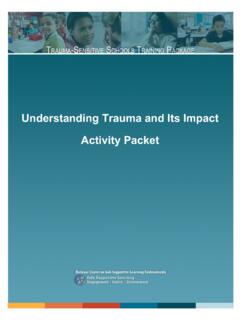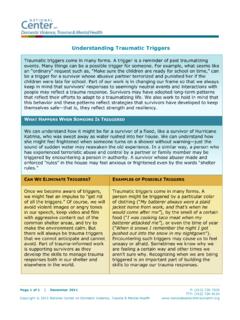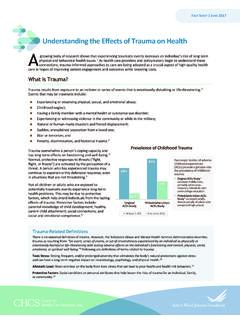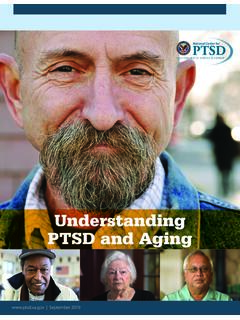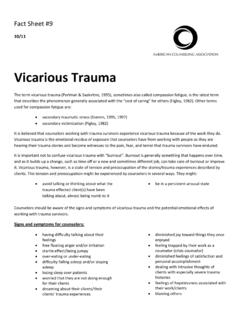Transcription of Intergenerational Trauma: Understanding Natives’ Inherited ...
1 Intergenerational trauma : Understanding Natives' Inherited Pain By Mary Annette Pember Intro trauma has been garnering more and more attention over the past few years, with the rampant climb of Post-Traumatic Stress Disorder, and the Understanding of what can cause it. Intergenerational trauma among American Indians is an area of study that has just started to generate attention from communities inside Indian country, academicia and the medical profession. Mary Annette Pember has worked for several years to help bring this dynamic issue to the forefront of mainstream health. Her reporting for ICTMN, with the help of support from The Rosalynn Carter Fellowships for Mental Health Journalism and Annenberg School for Communications and Journalism, University of Southern California; the Dennis A.
2 Hunt Fund for Health Journalism has addressed the concept of Intergenerational trauma at its core. By addressing breaking news, such as recent evidence that this type of trauma could be passed along through DNA, and by providing several ways of how American Indians are managing and coping with trauma , Pember helps put a human face on abstract theory and practice. Here she shares personal stories that are gritty, poignant and factual. All Content 2016 Indian Country Today Media Network, LLC. Read more at 2. trauma May Be Woven Into DNA of Native Americans trauma is big news these days. Mainstream media is full According to Bitsoi, epigenetics is beginning to of stories about the dramatic improvements allowing uncover scientific proof that Intergenerational trauma science to see more clearly how trauma affects our is real.
3 Historical trauma , therefore, can be seen as a bodies, minds and even our genes. Much of the coverage contributing cause in the development of illnesses such hails the scientific connection between trauma and as PTSD, depression and type 2 diabetes. illness as a breakthrough for modern medicine. The next What exactly is historical or Intergenerational trauma ? breakthrough will be how trauma affects our offspring. Michelle M. Sotero, an instructor in Health Care The science of epigenetics, literally above the gene, Administration and Policy at the University of Nevada, proposes that we pass along more than DNA in our offers a three-fold definition.
4 In the initial phase, genes; it suggests that our genes can carry memories of the dominant culture perpetrates mass trauma on a trauma experienced by our ancestors and can influence population in the form of colonialism, slavery, war or how we react to trauma and stress. The Academy of genocide. In the second phase the affected population Pediatrics reports that the way genes work in our bodies shows physical and psychological symptoms in response determines neuroendocrine structure and is strongly to the trauma . In the final phase, the initial population influenced by experience. [Neuroendocrine cells help passes these responses to trauma to subsequent the nervous and endocrine (hormonal) system work generations, who in turn display similar symptoms.]
5 Together to produce substances such as adrenaline (the According to researchers, high rates of addiction, hormone associated with the fight or flight response.] suicide, mental illness, sexual violence and other trauma experienced by earlier generations can influence ills among Native peoples might be, at least in part, the structure of our genes, making them more likely to influenced by historical trauma . Bonnie Duran, switch on negative responses to stress and trauma . associate professor in the Department of Health In light of this emerging science and how it works Services at the University of Washington School of with the way we react to trauma , the AAP stated in Public Health and Director for Indigenous Health its publication, Adverse Childhood Experiences and Research at the Indigenous Wellness Research Institute the Lifelong Consequences of trauma , Never before says, Many present-day health disparities can be traced in the history of medicine have we had better insight back through epigenetics to a colonial health deficit.)
6 Into the factors that determine the health of an the result of colonization and its aftermath.. individual from infancy to adulthood, which is part According to the American Indian and Alaska Native of the life course perspective a way of looking at life Genetics Research Guide created by the National not as disconnected stages but as integrated across Congress of American Indians (NCAI), studies have time, according to the AAP in their recent publication shown that various behavior and health conditions are examining the role of Adverse Childhood Experience due to Inherited epigenetic changes. (ACES) on our development and health. The now famous 1998 ACES study conducted by the Centers for Authors of the guide refer to a 2008 study by Moshe Disease Control (CDC) and Kaiser Permanente showed Szyf at McGill University in Montreal that examined that such adverse experiences could contribute to the brains of suicide victims.
7 Szyf and his team found mental and physical illness. that genes governing stress response in the victim's hippocampus had been methylated or switched off. Folks in Indian country wonder what took science so Excessive trauma causes us to produce hormones called long to catch up with traditional Native knowledge. glucocorticoids which can alter gene expression. Chronic Native healers, medicine people and elders have exposure to this hormone can inhibit genes in the always known this and it is common knowledge in hippocampus ability to regulate glucocorticoids. Szyf Native oral traditions, according to LeManuel Lee suggested that the genes were switched off in response Bitsoi, Navajo, PhD Research Associate in Genetics to a series of events, such as abuse during childhood.
8 All at Harvard University during his presentation at the victims in the study were abused as children. Gateway to Discovery conference in 2013. All Content 2016 Indian Country Today Media Network, LLC. Read more at 3. Nature or Nurture? It's Both! opportunity to characterize the long-term impact of stressors including historical trauma on the function Szyf, in collaboration with another scientist at McGill, of genes. The modification of gene function through Neurobiologist Michael Meaney, did research showing epigenetic modifications can greatly impact the health a significant difference in the hippocampus between of the individual and may underlie some of the health adult rats raised by attentive and inattentive mothers.
9 Disparities that we observe in populations including Adult offspring of inattentive rat mothers showed genes Native Americans. This line of research is of great regulating sensitivity to stress to be highly methylated. promise for nurse scientists, as it will be instrumental in The rats with attentive moms did not. the promotion of the health and well-being of patients To test their research they switched the parents for rat impacted by trauma and stress.. babies born to bad and good mothers. The babies born Although epigenetics offers the hope of creating better to attentive moms but given to inattentive moms also and more specific medicines and interventions for developed highly methylated genes and grew to be mental health problems, it also suggests the notion skittish adults.
10 The opposite proved true for babies born that Native peoples and other ethnic groups may be to bad moms but given to good moms. As adults the rat genetically inferior. babies born to bad moms but raised by good mothers appeared calm. Researchers such as Shannon Sullivan, professor of philosophy at UNC Charlotte, suggests in her article This research seems to combine the historically Inheriting Racist Disparities in Health: Epigenetics polarizing theory of nature versus nurture in determining and the Transgenerational Effects of White Racism, . behavior. Nature is that which is Inherited while nurture that the science has faint echoes of eugenics, the social is the environmental influences.
